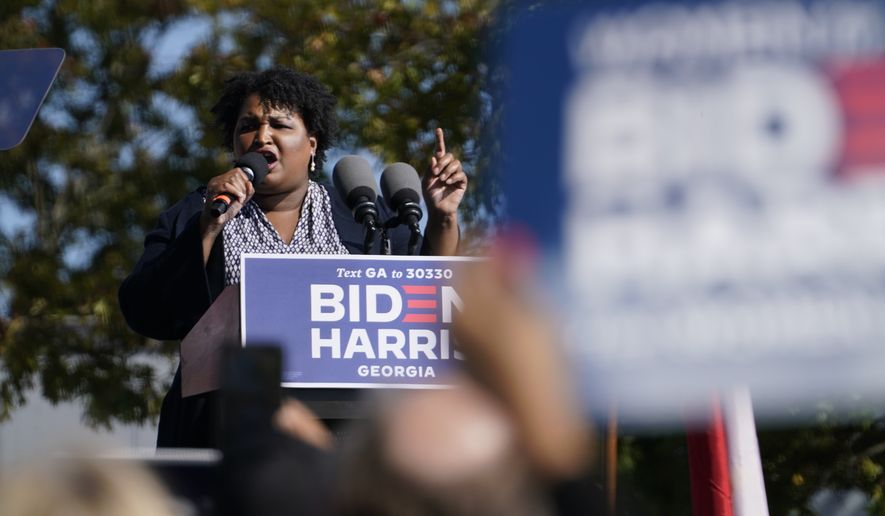The biggest thing Stacey Abrams could have done to help presumptive President-elect Joseph R. Biden win the 2020 election was to fall short in her 2018 bid to become the nation’s first Black female governor.
The sting of her loss, and her refusal to concede, kept activists locked in, and, in turn, not only helped Mr. Biden win the state but also helped force a pair of Senate runoff races early next year that will shape national politics for years to come.
“After she lost, it further energized our base because we felt that was a race that was stolen from us,” said Lewanna Heard-Tucker, chairwoman of the Fulton County, Georgia, Democratic Committee.
“It really caused us to wake up and see what was happening and it helped engage people, and I think that was the springboard,” she said. “It was kind of the catalyst that started all of this. It was the fire in the belly that she ignited.”
Ms. Abrams has since flirted with a presidential run, lobbied for the job of vice president, and created the group Fair Fight in the name of combating voter suppression and educating voters.
There also is a lingering expectation that she will run again for governor in 2022.
“I’m nothing special,” Ms. Abrams said in a recent interview with Rolling Stone. “I just — I’m kind of relentless.”
Ms. Abrams is set to be back in the spotlight Friday when she joins former President Barack Obama for a virtual get-out-the-vote rally.
The event will put the pair’s political celebrity power behind Democrats Jon Ossoff and Raphael Warnock in their high-profile runoff races against Republican Sens. David Perdue and Kelly Loeffler.
Mr. Perdue and Ms. Loeffler will get a boost on their side at a rally Saturday with President Trump, who is expected to use the event to also push his claim that election fraud cost him Georgia in the Nov. 3 presidential race.
Vice President Mike Pence is set to be in the state Friday.
If Democrats win both runoff races, the Senate will have a 50-50 partisan split when it convenes next year, handing presumed Vice President-elect Kamala Harris the power to cast tie-breaking votes.
Before running for governor, Ms. Abrams served in the Georgia House of Representatives, where she rose to be the chamber’s minority leader.
In 2013, she started the New Georgia Project, which, similar to Fair Fight, focused on registering and educating voters.
Ms. Abrams’ work to expand the vote has faced scrutiny.
Mr. Trump accused her last week of illegally “harvesting” ballots to alter the outcome of the election in Georgia.
Georgia Secretary of State Brad Raffensperger announced this week that he has started an investigation into whether the New Georgia Project and other voter registration groups broke the law by fraudulently registering voters.
At a press conference, Mr. Raffensberger said his dead son received three mailers from the New Georgia Project urging him to vote.
“We have received specific evidence that these groups have solicited voter registrations from ineligible individuals who have passed away or live out of state,” he said in a statement. “I will investigate these claims thoroughly and take action against anyone attempting to undermine our elections.”
The current leader of the New Georgia Project said the allegation is bogus.
Republicans also have been happy to point out that Mr. Trump is borrowing a page out of Ms. Abrams’ playbook by refusing to concede in Georgia and by blaming the outcome of the race on shady actors and political shenanigans.
In 2018, Ms. Abrams accused then-Secretary of State Brian Kemp, who won the governor’s race, of purging voter rolls and suppressing the vote, particularly in minority communities, and refused to concede her 55,000-vote loss.
“The joke in Georgia is she is our other governor,” said Jason Shepard, chairman of the Cobb County GOP. “Democrats have told me why doesn’t Trump concede the race, and I say maybe he should right after Stacey Abrams does.”
At the same time, Mr. Shepard said if Democrats win the Senate runoff races next month, Ms. Abrams deserves a lot of credit.
“Her biggest influence is sort of the system of absentee voting that she has worked over the past decade to set up,” Mr. Shepard said, citing her work identifying voters, making sure they can get absentee and mail-in ballots and know how to return them. “That is her greatest influence, not necessarily speaking for candidates but coming up with the tactics for really helping Democrats in the Atlanta metro areas, but not as much in the rural areas.”
He’s been sounding the alarm on that front, urging the GOP to put a greater emphasis and more money into the absentee ballot program.
“I think absentee ballots are predominately the reason we lost statewide this cycle,” he said of Mr. Trump’s loss. “I wish we had more of a response for absentee ballots and that we were taking them a little bit more seriously.”
As in other states, Mr. Trump’s strong in-person Election Day turnout was not enough to overcome Mr. Biden’s dominance in early and mail-in voting.
Mail-in ballots also were a primary reason why Mr. Perdue’s re-election race was pushed into a runoff contest.
The secretary of state said more than 1.3 million absentee ballots were cast in the election.
Ms. Abrams took to Twitter Thursday to celebrate the news that 1 million Georgians have requested their mail-in ballots for the Jan. 5 runoff.
“Our time is now to elect @ReverendWarnock and @ossoff to the U.S. Senate, so let’s get it done,” she said.
• Seth McLaughlin can be reached at smclaughlin@washingtontimes.com.




Please read our comment policy before commenting.